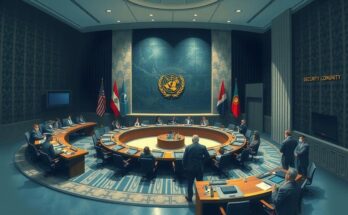The Namibia School of Diplomatic Studies has graduated its first cohort of students, marking a significant step in enhancing the country’s diplomatic capabilities. Minister Peya Mushelenga emphasized the vital role of diplomatic training in effective international representation, noting the school’s effective approach led by experienced diplomats. He encouraged graduates to apply their skills in diplomatic roles, celebrating the school’s impressive 92% pass rate and urging continued evolution in curricula to meet global standards.
The Namibia School of Diplomatic Studies (NSDS) has inaugurated its first cohort of graduates, enhancing the nation’s diplomatic capabilities through a partnership between the Ministry of International Relations and Cooperation and the University of Namibia. This educational institution aims to strengthen Namibia’s diplomatic corps by equipping students with essential negotiation skills and insight into global political and economic landscapes.
During the graduation ceremony, Minister Peya Mushelenga highlighted the longstanding role of diplomatic academies in shaping global practices, tracing back to the establishment of the Vienna Diplomatic Academy in 1754. He emphasized their importance in fostering professional diplomatic careers through the combination of theoretical and practical knowledge.
Mushelenga praised the NSDS for its effective instructional approach, which includes experienced diplomats teaching modules, many of whom have served as heads of missions or held significant roles in international relations. This experience significantly benefits the training of future diplomats, preparing them for the challenges ahead.
The minister also noted Namibia’s engagement in multilateral diplomacy, including its contribution to the African Union Peace and Security Council and participation in significant United Nations initiatives. For instance, Ambassador Neville Gertze recently co-facilitated negotiations for the Pact of the Future, demonstrating Namibia’s commitment to sustainable international collaboration.
Furthermore, Minister Mushelenga urged the NSDS to remain adaptable to the evolving nature of diplomacy by customizing courses for various career stages and aspiring for membership in the International Forum on Diplomatic Training, which includes over 60 countries’ diplomatic academies. He commended the school for achieving a 92% pass rate in its inaugural intakes, suggesting it is on a path to becoming a premier institution for diplomatic training.
In concluding remarks, the minister encouraged graduates, especially those within the Foreign Service, to actively implement the skills acquired through their education, thereby enhancing the quality of their contributions to Namibia’s diplomatic mission, reflecting improved competence and preparedness for their roles.
The Namibia School of Diplomatic Studies has marked a significant milestone with its first graduation, underscoring the importance of structured diplomatic education. Minister Peya Mushelenga’s remarks highlight the need for high-quality diplomatic training and continuous adaptability in response to changing global dynamics. As graduates step into their roles, their enhanced skills are expected to contribute positively to Namibia’s international diplomacy.
Original Source: www.observer24.com.na




